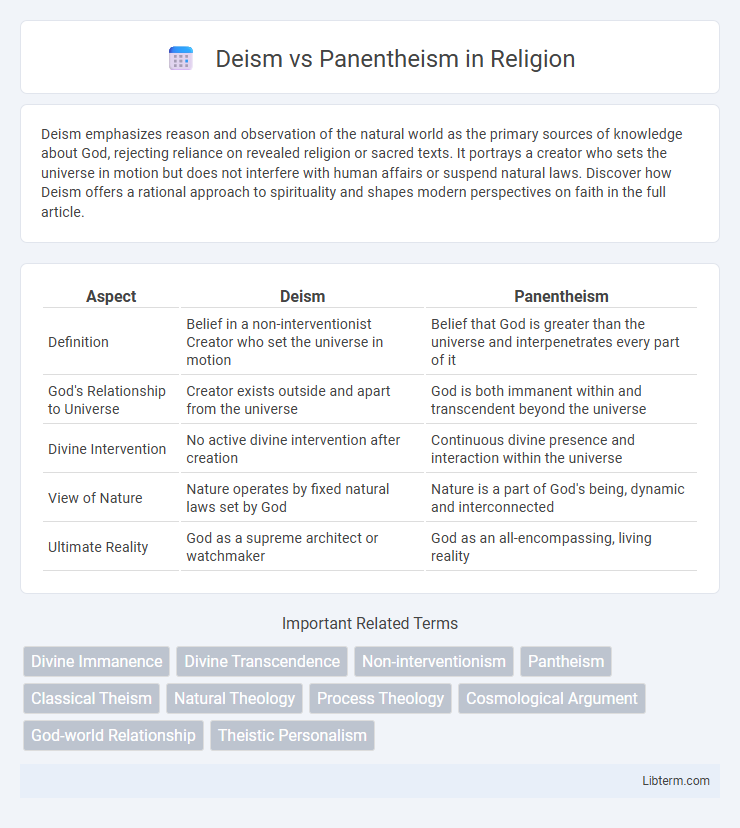Deism emphasizes reason and observation of the natural world as the primary sources of knowledge about God, rejecting reliance on revealed religion or sacred texts. It portrays a creator who sets the universe in motion but does not interfere with human affairs or suspend natural laws. Discover how Deism offers a rational approach to spirituality and shapes modern perspectives on faith in the full article.
Table of Comparison
| Aspect | Deism | Panentheism |
|---|---|---|
| Definition | Belief in a non-interventionist Creator who set the universe in motion | Belief that God is greater than the universe and interpenetrates every part of it |
| God's Relationship to Universe | Creator exists outside and apart from the universe | God is both immanent within and transcendent beyond the universe |
| Divine Intervention | No active divine intervention after creation | Continuous divine presence and interaction within the universe |
| View of Nature | Nature operates by fixed natural laws set by God | Nature is a part of God's being, dynamic and interconnected |
| Ultimate Reality | God as a supreme architect or watchmaker | God as an all-encompassing, living reality |
Introduction to Deism and Panentheism
Deism posits a non-interventionist Creator who set the universe in motion and does not interfere with its natural laws, emphasizing reason and observation over revelation. Panentheism, by contrast, envisions God as interwoven with the universe, transcending it while also permeating all aspects of existence, blending immanence and transcendence. Both philosophies address the divine's relationship to the cosmos but diverge on God's ongoing involvement in the universe.
Historical Origins of Deism
Deism emerged in the 17th century during the Age of Enlightenment, characterized by thinkers like John Locke and Voltaire who emphasized reason and natural law over revealed religion. It posits a non-interventionist Creator who establishes the universe but does not interfere with its functioning, contrasting with Panentheism's belief in a divine presence permeating and transcending the universe. The historical origins of Deism laid the groundwork for modern secularism by challenging orthodox religious doctrines and promoting a rational approach to theology.
Historical Development of Panentheism
Panentheism emerged as a significant theological concept during the early modern period, influenced by German Romanticism and the works of philosophers like Friedrich Wilhelm Joseph Schelling and Georg Wilhelm Friedrich Hegel. This doctrine posits that divinity pervades and interpenetrates the universe while also transcending it, differing from Deism's belief in a non-interventionist, detached creator. Historically, panentheism has roots in ancient Hinduism and Neoplatonism but gained distinct prominence in 19th-century Western philosophy and contemporary process theology.
Core Beliefs: Deism Explained
Deism centers on the belief in a rational Creator who designed the universe but does not intervene in its workings or human affairs. This core tenet rejects supernatural revelations and miracles, emphasizing reason and natural laws as the true sources of knowledge about God. Deists maintain that the universe operates autonomously, with divine action limited to the moment of creation.
Core Beliefs: Panentheism Explained
Panentheism posits that the divine interpenetrates every part of the universe while extending beyond it, suggesting that God is both immanent and transcendent. Core beliefs emphasize a dynamic relationship where the universe exists within God, yet God's essence surpasses physical reality. This contrasts with Deism, which holds God as a detached creator who does not intervene in the universe after its creation.
God’s Relationship with the Universe
Deism posits a Creator who initiates the universe but remains uninvolved in its ongoing processes, emphasizing a distant and non-interventionist God. Panentheism presents God as both immanent within and transcendent beyond the universe, actively sustaining and permeating all existence. This distinction highlights Deism's emphasis on a separate, watchful deity versus Panentheism's vision of a dynamic, interconnected divine presence.
Views on Divine Intervention
Deism posits that the divine set the universe in motion but does not intervene in worldly affairs or alter natural laws, emphasizing a detached creator who allows the cosmos to operate autonomously. Panentheism asserts that the divine permeates and interpenetrates the universe, continuously sustaining and interacting with the world, allowing for ongoing divine presence and influence within creation. While Deism views divine intervention as absent or unnecessary, Panentheism embraces a dynamic relationship where the divine actively engages with and shapes existence.
Sacred Texts and Authority
Deism rejects revealed sacred texts and divine authority, emphasizing reason and observation of the natural world as the sole guides to understanding God. Panentheism often incorporates sacred texts from various religious traditions, interpreting them metaphorically to express the divine presence within and beyond the universe. While Deism views sacred texts as human creations without inherent divine authority, Panentheism regards them as important spiritual resources that reveal the interconnectedness of all existence.
Impact on Philosophy and Science
Deism influences philosophy and science by promoting a rational understanding of the universe, emphasizing a non-interventionist Creator who initiates natural laws without ongoing interference, thereby encouraging empirical investigation and the pursuit of scientific knowledge. Panentheism impacts both fields by proposing that the divine interpenetrates and extends beyond the universe, fostering a holistic worldview that integrates spirituality with scientific inquiry, inspiring ethical considerations in environmental science and cosmology. The contrast between Deism's detached deity and Panentheism's immanent divine presence shapes diverse philosophical debates on causality, consciousness, and the relationship between metaphysics and empirical evidence.
Contemporary Relevance and Debates
Deism, emphasizing a non-interventionist creator, contrasts with Panentheism's belief in a divine presence permeating the universe, sparking contemporary debates on spirituality and science integration. Panentheism gains traction in environmental ethics discussions, offering a framework that connects divinity with ecological responsibility, while Deism appeals to secular thinkers valuating reason and empirical evidence. Both worldviews challenge traditional theistic doctrines, influencing dialogues on metaphysics, morality, and the nature of divine interaction in modern philosophical and theological discourse.
Deism Infographic

 libterm.com
libterm.com